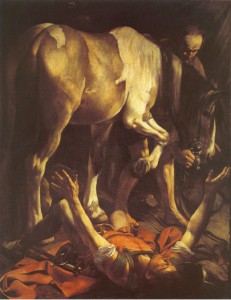 When Jesus Christ confronted Saul on the road to Damascus, he showed himself to be the greatest teacher, the ultimate rabbi. The ascended Christ is that teacher “than which none greater can be imagined.”
When Jesus Christ confronted Saul on the road to Damascus, he showed himself to be the greatest teacher, the ultimate rabbi. The ascended Christ is that teacher “than which none greater can be imagined.”
He taught so much in so few words. Look at Acts 26:14: “It is hard for you to kick against the goads.'” It’s easy enough to know what that means if you’ve worked with farm animals: a goad is a stick you use to let farm animals know where you want them to go. You give them a little poke. If a horse or cow or donkey takes a kick at the goad, you poke them harder. It’s a short game and the farmer always wins. That’s easy enough to understand, though it’s an arresting thing for Jesus to say, sort of like “You are the cow and I am the farmer. Go this way.”
What is not clear is precisely what there is in Saul’s life that Jesus is referring to. It’s not a matter of disobedience, as if Saul secretly knew that Jesus was the divine Messiah but was acting in rebellion against him: No, when he writes about this later, Paul is very clear that he was serving God the best he knew how. What are the goads, then?
Saul is a scholar, so perhaps Jesus is referring to something that Saul has been trying to understand in the Scriptures. Jesus the divine teacher has been leading Saul into truth, but Saul doesn’t quite get it and keeps coming to the wrong conclusion, and the goads are the little sparks of insight that he keeps bypassing, the conclusion he keeps not quite drawing.
Maybe. But only maybe. I’ve pondered this phrase and read a lot of commentaries, and it seems to me that scripture doesn’t let us all the way in on the secret of these goads. We’re overhearing a rather intimate exchange that takes place in the middle of the road. But one thing is clear: Saul understands exactly what Jesus means, and Jesus has said precisely the word that pierces Saul’s heart. It is a direct hit, it takes him down, and reorients him permanently. Jesus is still the ultimate teacher, and knows the inner history of that impossible convert you’ve lost interest in praying for. He knows what to say to them.
Next lesson. Jesus says: “Why are you persecuting me?” Saul has already admitted (verse 9) that he was opposing the name of Jesus, and that whatever he did to Christians, his real target was not them but their Lord and his name. He meant it personally against the name of Jesus, and Jesus took it personally. Jesus Christ is present in his people, he is personally implicated in what happens to them, he takes their sufferings personally. Again, this is a word that Saul hears with crystal clarity. He doesn’t argue, he understands what he is being taught. This first lesson in the school of Christ —that Jesus is the head and the church is his own body —is one that Saul will meditate on for decades. These first few words Jesus speaks to Saul turn Saul’s world inside out, and he spends the rest of his life pondering them and teaching them:
in Ephesians, that there is one body, one Lord, one baptism;
in Corinthians, that every member of the church needs the others;
in Philippians, that there is a mysterious sharing of suffering between Jesus Christ and those who are in him.
All of this comes from the lesson which Jesus teaches on the road to Damascus, with his opening question: “Saul, Saul, why do you persecute me?” Later, Saul affirms, “O King Agrippa, I was not disobedient to the heavenly vision,” and he’s telling the truth. He learned his lessons.
With that kind of first lesson, the follow-up lessons come quickly. Saul is radically reoriented on the spot, and the impossible convert becomes a pliable student in the school of Jesus. It’s as if Jesus says, “Everything you know is wrong. Fall down, stand up. Go blind, receive your sight. Stop going to Damascus, now go to Damascus.”
The great thing about the version of the story we get in Acts 26 (contrasted with Acts 9 and Acts 22) is that big block of red print, the five verses of Jesus speaking for himself, laying out the special work he has Saul cut out for.
But rise and stand upon your feet, for I have appeared to you for this purpose, to appoint you as a servant and witness to the things in which you have seen me and to those in which I will appear to you, delivering you from your people and from the Gentiles—to whom I am sending you to open their eyes, so that they may turn from darkness to light and from the power of Satan to God, that they may receive forgiveness of sins and a place among those who are sanctified by faith in me. (Acts 26:15-18)
This is another advantage of serving a living savior: he doesn’t just convert you, he lays out a life of service, a vision for what to do with your life. He has a project that’s bigger than you, and a role for you to play in that project. The school of Jesus is a school of lifelong learning that includes many surprising lessons, but Jesus himself knows the plans from the beginning, and knows you better than you know yourself.